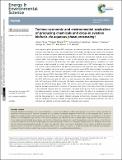| dc.contributor.author | Upadhye, Aniruddha A. | |
| dc.contributor.author | Hileman, James I. | |
| dc.contributor.author | Huber, George W. | |
| dc.contributor.author | Olcay, Hakan O. | |
| dc.contributor.author | Malina, Robert | |
| dc.contributor.author | Barrett, Steven R. H. | |
| dc.date.accessioned | 2018-07-11T16:04:44Z | |
| dc.date.available | 2018-07-11T16:04:44Z | |
| dc.date.issued | 2018-05 | |
| dc.date.submitted | 2017-12 | |
| dc.identifier.issn | 1754-5692 | |
| dc.identifier.issn | 1754-5706 | |
| dc.identifier.uri | http://hdl.handle.net/1721.1/116899 | |
| dc.description.abstract | Novel aqueous-phase processing (APP) techniques can thermochemically convert cellulosic biomass into chemicals and liquid fuels. Here, we evaluate these technologies through process design and simulation, and from a techno-economic and environmental point of view. This is the first peer-reviewed study that conducts such an assessment taking into account different biomass pretreatment methods, process yields, product slates, and hydrogen sources, as well as the historical price variation of a number of core commodities involved in the production. This paper undertakes detailed process simulations for seven biorefinery models designed to convert red maple wood using a set of APP technologies into chemicals (e.g. furfural, hydroxymethylfurfural and gamma-valerolactone) and liquid fuels (e.g. naphtha, jet fuel and diesel). The simulation results are used to conduct a well-to-wake (WTW) lifecycle analysis for greenhouse gas (GHG) emissions, and minimum selling price (MSP) calculations based on historical commodity price data from January 2010 to December 2015. An emphasis has been given towards aviation fuels throughout this work, and the results have been reported and discussed extensively for these fuels. It is found that the WTW GHG emissions and the MSP of jet fuel vary across the different refinery configurations from 31.6–104.5 gCO2e per MJ (64% lower and 19% higher, respectively, than a reported petroleum-derived fuel baseline) and $1.00–6.31 per gallon ($0.26–1.67 per liter, which is 61% lower and 146% higher, respectively, than the average conventional jet fuel price of the above time frame). It has been shown that the variation in the estimated emissions and fuel selling prices is primarily driven by the choice of hydrogen source and the relative production volumes of chemicals to fuels, respectively. The latter is a consequence of the fact that the APP chemicals considered here have a higher economic value than the liquid transportation fuels, and that their production is less carbon intensive compared to these fuels. However, the chemical market may get saturated if they are produced in large quantities, and increasing biofuel production over that of chemicals can help the biorefinery benefit under renewable fuel programs. | en_US |
| dc.publisher | Royal Society of Chemistry (RSC) | en_US |
| dc.relation.isversionof | http://dx.doi.org/10.1039/c7ee03557h | en_US |
| dc.rights | Creative Commons Attribution-NonCommercial 3.0 Unported | en_US |
| dc.rights.uri | https://creativecommons.org/licenses/by-nc/3.0/ | en_US |
| dc.source | Royal Society of Chemistry | en_US |
| dc.title | Techno-economic and environmental evaluation of producing chemicals and drop-in aviation biofuels via aqueous phase processing | en_US |
| dc.type | Article | en_US |
| dc.identifier.citation | Olcay, Hakan et al. "Techno-economic and environmental evaluation of producing chemicals and drop-in aviation biofuels via aqueous phase processing." Energy & Environmental Science (May 2018) © 2018 Royal Society of Chemistry | en_US |
| dc.contributor.department | Massachusetts Institute of Technology. Department of Aeronautics and Astronautics | en_US |
| dc.contributor.mitauthor | Olcay, Hakan O. | |
| dc.contributor.mitauthor | Malina, Robert | |
| dc.contributor.mitauthor | Barrett, Steven R. H. | |
| dc.relation.journal | Energy & Environmental Science | en_US |
| dc.eprint.version | Final published version | en_US |
| dc.type.uri | http://purl.org/eprint/type/JournalArticle | en_US |
| eprint.status | http://purl.org/eprint/status/PeerReviewed | en_US |
| dc.date.updated | 2018-07-11T15:31:41Z | |
| dspace.orderedauthors | Olcay, Hakan; Malina, Robert; Upadhye, Aniruddha A.; Hileman, James I.;
Huber, George W.; Barrett, Steven R. H. | en_US |
| dspace.embargo.terms | N | en_US |
| dc.identifier.orcid | https://orcid.org/0000-0002-4642-9545 | |
| mit.license | PUBLISHER_CC | en_US |
